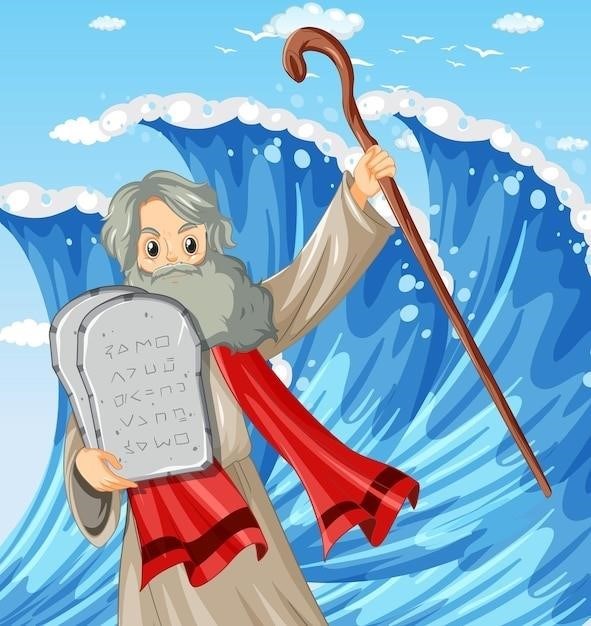Moses and Monotheism⁚ A Psychoanalytic Perspective
Freud’s final work, exploring the origins of monotheism through a psychoanalytic lens, sparked intense debate and diverse interpretations. His controversial hypotheses regarding Moses’s identity remain a subject of ongoing scholarly discussion.
Freud’s Final Work
Sigmund Freud’s Moses and Monotheism, published in 1939, stands as his last major contribution to psychoanalytic theory and a bold foray into historical and religious speculation. This ambitious work, available in PDF format online and through various archives, presents a complex hypothesis about the origins of monotheism, weaving together psychoanalytic concepts with historical conjecture. The book’s three essays explore the psychological underpinnings of religious belief, delving into the dynamics of collective guilt, repression, and the formation of religious identity. Freud’s unconventional approach, challenging established historical narratives and theological interpretations, has generated considerable controversy and ongoing debate among scholars across various disciplines. The accessibility of Moses and Monotheism in PDF format allows for widespread engagement with Freud’s provocative ideas and their lasting impact on religious studies and psychoanalysis.
Controversies and Interpretations
Freud’s Moses and Monotheism, readily accessible in PDF format, has been met with considerable controversy since its publication. The book’s central hypothesis—that Moses was an Egyptian who introduced monotheism to the Israelites—directly challenges traditional biblical accounts and has been vigorously debated by historians and theologians. The psychoanalytic framework employed by Freud further fuels the controversy, with critics questioning the applicability of psychological theories to historical events. Interpretations of the work range from those who see it as a brilliant, albeit speculative, exploration of the origins of religion and identity, to those who dismiss it as an unsubstantiated and anachronistic attempt to impose a psychological narrative on historical data. The continued availability of the work in digital formats ensures its ongoing engagement within scholarly discourse, fostering renewed debate and analysis of Freud’s complex and controversial arguments.
The Origins of Monotheism
Freud’s Moses and Monotheism, easily found in PDF format online, offers a unique perspective on the development of monotheistic religion. He posits a complex historical and psychological narrative, suggesting that monotheism wasn’t a sudden revelation but rather a gradual evolution stemming from the traumatic experiences and collective psyche of the Israelite people. Freud proposes that Moses, a figure of significant debate within the text, played a pivotal role in this transition, introducing a revolutionary concept that profoundly impacted religious thought. The book argues that the adoption of monotheism wasn’t a simple acceptance of a new belief system, but instead involved profound psychological shifts and a grappling with the implications of a singular, all-powerful God. The text’s exploration of these dynamics continues to spark discussion and reinterpretation amongst scholars and readers alike. This makes the readily available PDF version a crucial resource for those seeking to engage with Freud’s complex and influential theory.

Moses’s Identity⁚ Fact and Fiction
Freud’s controversial assertion that Moses was an Egyptian, not a Hebrew, ignited fervent debate, challenging traditional biblical narratives and sparking ongoing scholarly discussion.
The Egyptian Hypothesis
A cornerstone of Freud’s Moses and Monotheism, the Egyptian hypothesis posits that Moses, the pivotal figure in the development of monotheism, was not of Hebrew origin but rather an Egyptian. This radical proposition, directly contradicting traditional biblical accounts, suggests Moses was a high-ranking official within the Egyptian court who adopted a monotheistic belief system, starkly contrasting the polytheistic practices prevalent in ancient Egypt. Freud’s theory hinges on the idea that Moses, imbued with his unique religious vision, attempted to impose this monotheistic faith upon the Israelites, a task ultimately resulting in his murder at the hands of his followers. The hypothesis is based on an interpretation of various historical and religious texts and seeks to explain the origins of Judaism’s unique monotheistic tradition through a psychoanalytic lens. The controversial nature of this hypothesis continues to stimulate academic debate, prompting critical analysis and diverse interpretations within religious studies and psychoanalysis. The impact of Freud’s Egyptian hypothesis on our understanding of Moses’s identity and the evolution of monotheism remains a significant area of ongoing scholarly inquiry and discussion. Evidence for and against this hypothesis has been explored by numerous scholars, making it a compelling topic of ongoing discussion.
Moses as a Non-Hebrew
Freud’s controversial assertion that Moses was not of Hebrew descent but rather Egyptian profoundly alters the traditional narrative. This radical reinterpretation challenges established historical and religious accounts, suggesting a complex interplay of cultural and religious influences in the formation of Judaism. By portraying Moses as an Egyptian, Freud introduces a new perspective on the origins of monotheism, proposing a potential explanation for the internal conflicts and tensions within early Israelite society. This perspective highlights the possibility of a significant cultural exchange and the potential for religious ideas to transcend ethnic boundaries. The idea of a non-Hebrew Moses compels a reassessment of the historical and religious context surrounding the development of monotheistic thought, adding layers of complexity to the story of the Israelites’ journey toward a singular deity. The implications of this hypothesis extend beyond simple biographical detail; they raise questions about cultural appropriation, religious innovation, and the transmission of belief systems across different societies. The debate surrounding Moses’s true origins remains a crucial point of discussion in understanding the development of Judaism and its relationship to ancient Egypt.
Historical and Religious Debates
Freud’s proposition of Moses’s Egyptian origins ignited fervent debate among historians and theologians. Scholars have scrutinized archaeological evidence, textual interpretations, and anthropological perspectives to evaluate the validity of Freud’s claims. The lack of definitive historical proof for either a Hebrew or Egyptian Moses fuels ongoing scholarly discussion, with some supporting Freud’s theory and others firmly rejecting it. The religious implications are equally profound, challenging traditional interpretations of biblical narratives and raising questions about the origins and evolution of religious beliefs. This ongoing discussion highlights the interplay between historical research, religious dogma, and psychoanalytic interpretation in understanding the complexities of early Israelite history and the development of monotheism. The debate surrounding Moses’s identity continues to shape academic discourse, revealing the enduring power of Freud’s controversial ideas and their lasting impact on the study of religion and history. The lack of conclusive evidence allows for diverse perspectives and interpretations, keeping the subject a focus of ongoing scholarly inquiry and discussion.
Psychoanalytic Theory and Religion
Freud’s psychoanalytic approach to religion, as seen in Moses and Monotheism, explores the psychological roots of religious beliefs and practices, examining their connection to individual and collective neuroses.
Freud’s Psychoanalytic Approach to Religion
In Moses and Monotheism, Freud employs his psychoanalytic framework to investigate the psychological underpinnings of religious belief systems. He moves beyond a purely sociological or historical analysis, delving into the unconscious motivations and anxieties that shape religious experience. Freud posits that religion, particularly monotheism, arises from deeply ingrained human needs and desires, including the longing for a powerful paternal figure and the attempt to grapple with existential anxieties surrounding death and mortality. He suggests that religious beliefs serve as a form of wish fulfillment, offering solace and a sense of order in a chaotic world. The book’s exploration of the psychological dimensions of faith and the role of religious practices in managing guilt and repression is a key contribution to the field of psychoanalytic thought. Freud’s approach challenges traditional understandings of religion, framing it not merely as a social construct but as a product of profound psychological processes. This perspective, though controversial, has spurred considerable debate and continues to influence contemporary discussions on the relationship between psychoanalysis and religion.
Obsessive Neurosis and Religious Practices
Freud’s exploration in Moses and Monotheism links obsessive-compulsive tendencies with the development and adherence to religious practices. He suggests that the rigorous rituals and moral codes often associated with religious belief systems reflect underlying anxieties and attempts to control overwhelming feelings of guilt and uncertainty. The repetitive nature of prayers, sacrifices, and other religious observances, Freud argues, mirrors the compulsive behaviors seen in individuals diagnosed with obsessive-neurosis. These actions, while providing a sense of temporary relief and control, ultimately mask deeper psychological conflicts. The formation of strong moral codes and strict adherence to religious laws, according to Freud, can be viewed as a manifestation of an attempt to suppress primal impulses and manage the resulting internal conflict. This perspective, though not universally accepted, offers a unique psychoanalytic lens through which to understand the psychological dynamics at play in religious behavior and the potential connection between religious observance and neurotic tendencies.
Totem and Taboo
Freud’s earlier work, Totem and Taboo, significantly informs his later exploration of monotheism in Moses and Monotheism. The concepts of primal horde, totemism, and the father-murder are crucial to understanding Freud’s theory. In Totem and Taboo, Freud posits a primal scene where the sons of a tyrannical father band together, kill him, and then grapple with guilt and remorse. This act, he suggests, forms the basis for the development of social structures, morality, and religious beliefs. The totem animal represents both the slain father and the collective guilt of the sons. This primal event’s echoes resonate in Freud’s later work, informing his hypothesis about Moses’s murder and the subsequent formation of Jewish identity and monotheistic religion. The themes of guilt, repression, and the creation of moral codes explored in Totem and Taboo provide the foundational framework for understanding the psychoanalytic interpretations presented in Moses and Monotheism.
The Murder of Moses and its Aftermath
Freud’s controversial theory centers on the murder of Moses, followed by collective guilt and repression within the Israelite community. This trauma, he argues, profoundly shaped Jewish identity and religious practices.
Collective Guilt and Repression
Freud postulates that the murder of Moses, a pivotal figure in the transition to monotheism, induced profound collective guilt within the Israelite community. This guilt, he argues, was not consciously acknowledged but rather repressed into the unconscious, manifesting in various cultural and religious expressions. The subsequent development of Jewish identity and religious law, according to Freud’s interpretation, can be partly understood as a complex mechanism of defense against this traumatic event and the associated guilt. The repression of the primal act, the murder of their leader, created a profound psychological impact on the collective psyche of the Israelites, shaping their religious beliefs and practices in ways that still resonate today. The unresolved trauma, according to Freud’s psychoanalytic framework, manifests as a persistent and pervasive psychological undercurrent, influencing their collective identity and social structures. Analyzing the text reveals how the narrative of Moses’s death, its concealment, and the subsequent development of monotheistic religion become intertwined with the psychological mechanisms of repression and the formation of collective identity. The collective unconscious, laden with this unresolved guilt, became a driving force in shaping the psychological landscape of the Israelite community, influencing their relationship with their God and their conception of morality. This repression, Freud suggests, played a significant role in the development of their unique religious and cultural identity, a legacy that continues to shape Jewish identity and religious practice in modern times. The psychological impact of this repressed trauma extends far beyond the immediate historical context, leaving an enduring mark on the collective consciousness and shaping the trajectory of their history.
The Psychological Impact on the Israelites
Freud’s analysis in “Moses and Monotheism” posits a profound and lasting psychological impact on the Israelites following the murder of Moses. The act, deeply repressed, instilled collective guilt and a sense of profound loss, shaping their subsequent religious and cultural development. This trauma, according to Freud, manifested in a complex interplay of guilt, repression, and the creation of new belief systems as a means of coping with the unbearable weight of their collective action. The subsequent emphasis on monotheism, the strictures of the Mosaic Law, and the enduring sense of chosenness within Jewish identity are interpreted as responses to this deep-seated psychological trauma. The repressed memory of the regicide, Freud suggests, continued to exert a powerful influence on the collective psyche of the Israelites, shaping their self-perception, their relationship with God, and their social structures. The enduring legacy of this event, therefore, is not simply historical but also deeply psychological, impacting the community’s cultural identity and religious practices across generations. Freud’s psychoanalytic approach highlights the lasting impact of unresolved trauma on a collective identity, suggesting that the psychological consequences of the act of patricide shaped the religious and cultural development of the Israelite people in profound ways.
The Formation of Jewish Identity
In Sigmund Freud’s Moses and Monotheism, the murder of Moses and the subsequent collective guilt play a pivotal role in shaping Jewish identity. Freud argues that the traumatic event, though repressed, profoundly influenced the development of Jewish religious and cultural practices. The intense feelings of remorse and the need to atone for the patricide, according to Freud, led to the strict adherence to the Mosaic Law and the development of a unique ethical framework. This framework, characterized by a strong emphasis on monotheism and the concept of a covenant with God, served as a means of both expiation and collective self-definition. The enduring sense of chosenness and the emphasis on historical memory within Jewish culture, therefore, are viewed by Freud as direct consequences of this foundational trauma. The formation of Jewish identity, in this perspective, is not solely a historical process but a complex psychological one, rooted in the unresolved tensions and collective guilt stemming from the assassination of their founding figure. The resulting cultural and religious practices, therefore, are seen as both a response to and a manifestation of this deep-seated psychological dynamic.

Moses and Monotheism⁚ Legacy and Influence
Freud’s work continues to spark debate in religious studies and psychoanalysis. Its exploration of monotheism’s origins and the psychological impact of religious belief remains highly relevant in modern discussions.
Impact on Religious Studies
Sigmund Freud’s “Moses and Monotheism,” despite its controversial nature, significantly impacted religious studies. Its psychoanalytic approach challenged traditional historical and theological interpretations of Judaism’s origins and the development of monotheism. Scholars engaged with Freud’s provocative hypotheses regarding Moses’s Egyptian origins and the psychological mechanisms underlying religious belief. The book stimulated new avenues of inquiry into the relationship between psychology, religion, and cultural identity. Freud’s work forced a reevaluation of the psychological dimensions inherent in religious experience and the formation of religious traditions. The lasting influence of “Moses and Monotheism” lies in its ability to provoke critical examination of foundational religious narratives and the exploration of the complex interplay between individual psychology and collective religious identity. The book’s legacy continues to shape discussions within religious studies, prompting further investigation into the psychological underpinnings of faith and the development of religious systems.
Influence on Psychoanalytic Thought
Freud’s “Moses and Monotheism,” while not solely focused on psychoanalytic technique, significantly influenced subsequent psychoanalytic thought. Its exploration of collective guilt, religious obsession, and the psychological impact of historical trauma expanded the scope of psychoanalytic inquiry beyond individual psychopathology. The book’s ambitious attempt to apply psychoanalytic concepts to large-scale historical events and the development of religious systems broadened the field’s reach. Scholars debated Freud’s methodology and interpretations, but the work spurred further investigation into the psychological dimensions of cultural phenomena. The book’s engagement with the dynamics of group psychology and the transmission of trauma across generations inspired future psychoanalytic explorations of collective identity and cultural formations. Its enduring influence lies in its provocative challenge to traditional psychoanalytic boundaries, encouraging a more nuanced understanding of the interplay between individual and collective psychic processes. This expanded the analytical lens beyond the individual to include broad societal and historical forces shaping the human psyche.
